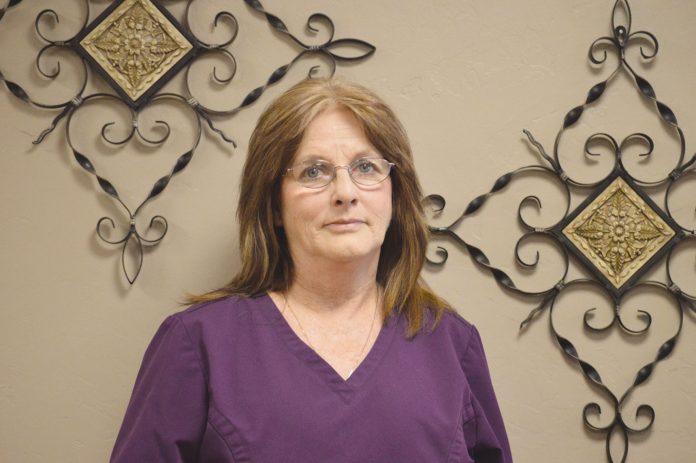by Traci Chapman
For Leila Reich, long-term care means a closeness with her patients not afforded many other nurses; she wouldn’t have it any other way.
“I love the nature of long-term acute care – you get to really know your patients, everybody’s got a story, you get close to people and you get to know their families, I love my patients and their families.”
A love for her chosen vocation runs as deep as her affection for her patients, the longtime LPN said. After working 10 years at Shawnee High School, Reich decided to make a change and headed to LPN school. After graduation, she worked for Hillcrest Hospital in Oklahoma City for eight years but then found a slightly different calling – long-term care. Reich joined what was then Vencor Hospital, which was to become Kindred, for 22 years. In October the name – and the hospital’s ownership – changed once again, when the facility became one of 12 long-term acute care facilities purchased by Dallas-based Curahealth.
While changes have brought with them challenges, one thing has always remained a constant – her patients and how deeply they have impacted her life.
“It is just such a special experience to really be able to practice the skills you have, do what you love but also be a friend, even a member of the family.”
“We have people come back for a visit or who give us a call to let us know how they’re doing, about maybe a milestone in a family member’s life, even to check on us, and we can call and check on them,” Reich said. “There’s that closeness, it really goes both ways and extends to the family members a lot of the time too.”
Family is what working at the facility is all about for Reich. Her husband, Willie, is also a Curahealth employee; with her longevity, Reich said she has forged lifelong bonds with a staff that inspires her to be her best every day.
“My coworkers are always there, they make me feel good about myself, sometimes they believe in me more than I do in myself,” Reich said. “I can be having a bad day, just feel off, and without fail they change that.”
Twelve-hour shifts also allow Reich to spend time at home. That means she has plenty of time for her three children and six grandchildren, one of the major benefits she has enjoyed in more than two decades working at the facility.
“It just makes such a difference to have that ability, where sometimes I hear from colleagues how they can’t attend this or that with family members,” Reich said. “Of course, I have that happen, but not very often.”
Those shifts also carry with them an added benefit, Reich said – not just a greater level of interaction and affection with her patients, but also the ability to develop skills at the LPN level that might not be possible at regular, short-term facilities.
“Keri (Chelf, Curahealth critical officer) treats LPNs like RNs, she respects our abilities and allows us to really demonstrate and improve our abilities,” she said. “That is very motivating.”
Reich said her biggest challenges – one old and one new – were her biggest. The nature of long-term care cases, things like wound care, respiratory and pulmonary ailments and the like, meant getting the patient up and around quickly was critical.
“Sometimes that can be difficult,” she said. “Maybe they’re afraid of that, they can be weak, emotionally drained even, but that step is just so vital.”
“It’s something we work on all the time, and we look to the family to help us in reminding our patients how important that is, even when they don’t feel like it,” Reich said.
The new challenge, which came with the October change from Kindred to Curahealth, was an administrative one – paper charting. In recent years, handwritten patient records have become almost obsolete as computerized records have taken hold. Paper charting is a Curahealth procedure, however, so it’s something both nursing and administrative staff are working together to acclimate to, Reich said.
“It’s funny, before it was learning the programs and the computerized way of doing things and now it’s kind of the opposite,” she said. “You don’t realize how much you’ve come to rely on doing it digitally.”
For now, that’s just a challenge that goes with the territory, and one Reich said is worth it for the opportunity to deal with patients on a level she has come to cherish every day.
“It means so much to be able to provide a better service because you get to know the patients so well, because you know their lives will be so much better because they have a true chance to heal in an environment like this,” Reich said. “It’s a blessing to them, but it’s a blessing to me too – because they’re my patients.”













